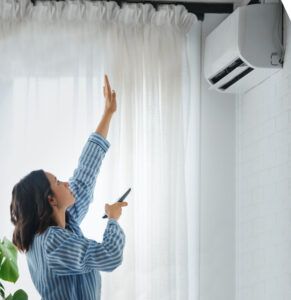
For many residents in Port St. Lucie, allergies can be a frustrating part of daily life. Whether triggered by pollen, dust mites, or mold, these allergens can make you feel uncomfortable at home. While most people consider outdoor factors when managing allergies, it’s important to recognize that your air conditioning system could also be contributing to your symptoms. Understanding the connection between your AC system and indoor air quality can help you take steps to alleviate your allergy issues.
How AC Systems Affect Indoor Air Quality
Air conditioning systems are designed to cool your home, but they also play a significant role in air quality. As the system circulates air, it can trap and filter out various allergens. However, if not maintained properly, your AC system can become a source of allergens rather than a solution. Dust, pollen, pet dander, and mold can accumulate in and around your system, circulating back into your home and exacerbating allergy symptoms.
The Role of Filters
One of the most critical components of your AC system is the air filter. These filters are designed to capture dust and allergens from the air before it circulates throughout your home. However, a clogged or dirty filter can become ineffective and restrict airflow. When this happens, your system works harder to cool the space, which can lead to higher energy bills and less effective cooling.
Regularly checking and changing your air filter is essential. For optimal performance, replace standard filters every one to three months, depending on usage and the presence of pets or allergens. Upgrading to a high-efficiency particulate air (HEPA) filter can also significantly improve air quality by capturing smaller particles that standard filters might miss.
Ductwork Maintenance
Another area where allergens can hide is in your ductwork. Dust, mold, and other particles can build up in the ducts over time, creating a breeding ground for allergens. When your AC system runs, these contaminants can be blown into your living spaces, aggravating allergy symptoms.
Scheduling regular duct cleaning can help remove accumulated dust and allergens from your system. A professional HVAC technician can inspect your ductwork for any signs of mold growth or damage, ensuring that your system is not contributing to your allergy problems.
Humidity Control
Humidity plays a significant role in indoor air quality and can impact allergy sufferers. High humidity levels can lead to mold growth and increase dust mite populations, both of which can trigger allergies. Air conditioning systems help regulate humidity levels by removing moisture from the air.
To maintain optimal humidity levels, ensure your AC system is set to run efficiently. You might also consider using a dehumidifier in conjunction with your AC, especially during the humid summer months in Florida. This can help keep indoor humidity levels in check and reduce the likelihood of mold growth.
Regular Maintenance is Key
Proper maintenance of your AC system is crucial for improving indoor air quality and reducing allergy symptoms. Scheduling regular professional inspections ensures that your system is clean, efficient, and functioning correctly. During these maintenance visits, technicians can check for issues like refrigerant leaks, airflow problems, and overall system performance.
In addition to professional maintenance, homeowners can take simple steps to improve air quality. Keeping windows closed during high pollen seasons, using doormats to reduce dirt entry, and regularly cleaning surfaces can all contribute to a healthier indoor environment.
Conclusion
If you are struggling with allergies, it’s worth examining your AC system as a potential contributor. By maintaining your air filters, cleaning your ducts, and managing humidity levels, you can improve your indoor air quality and create a healthier home. Regular professional maintenance will ensure your AC system effectively cools your home while reducing allergens. Taking these steps can help you breathe easier and enjoy your living space more fully in Port St. Lucie.